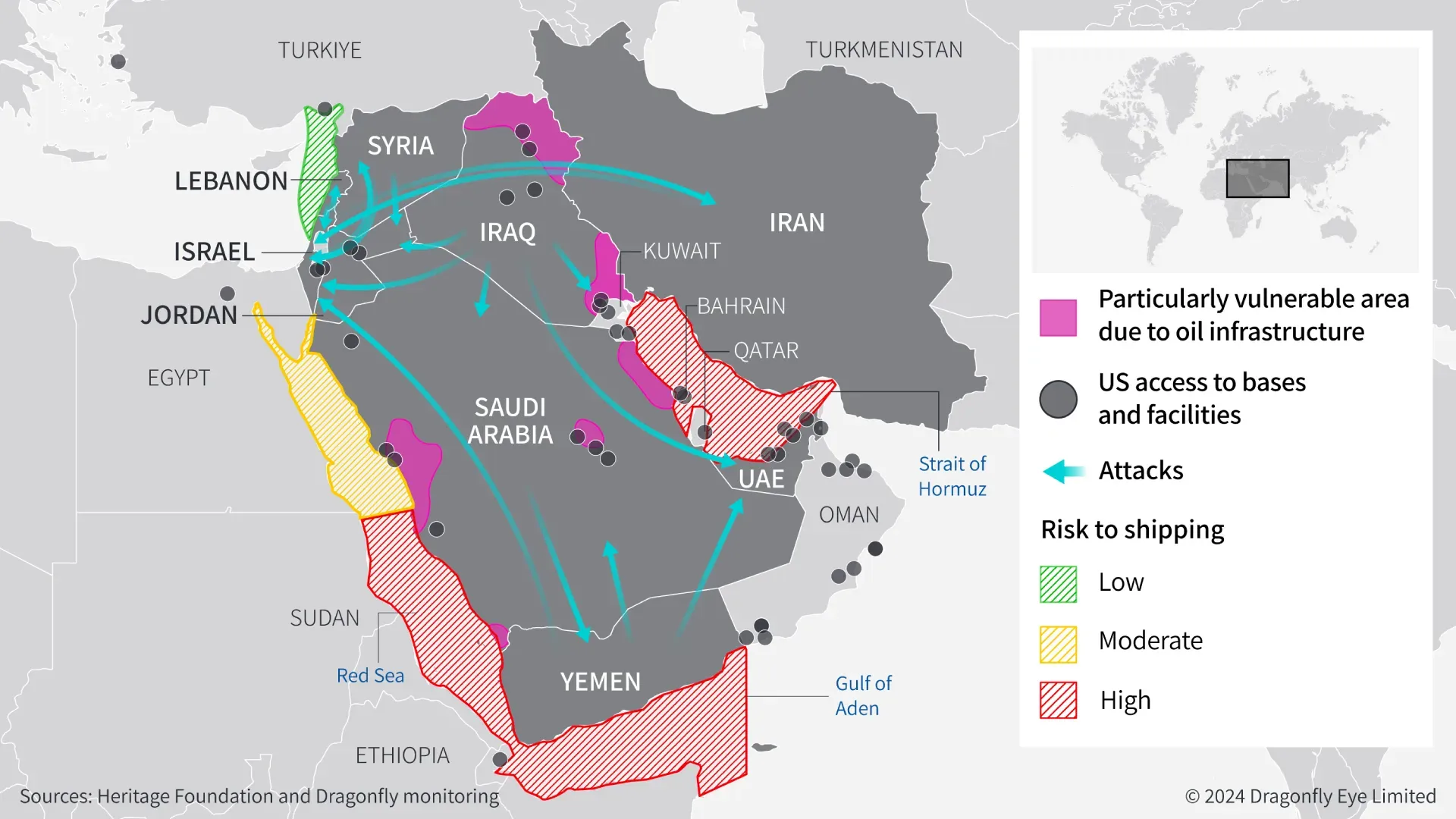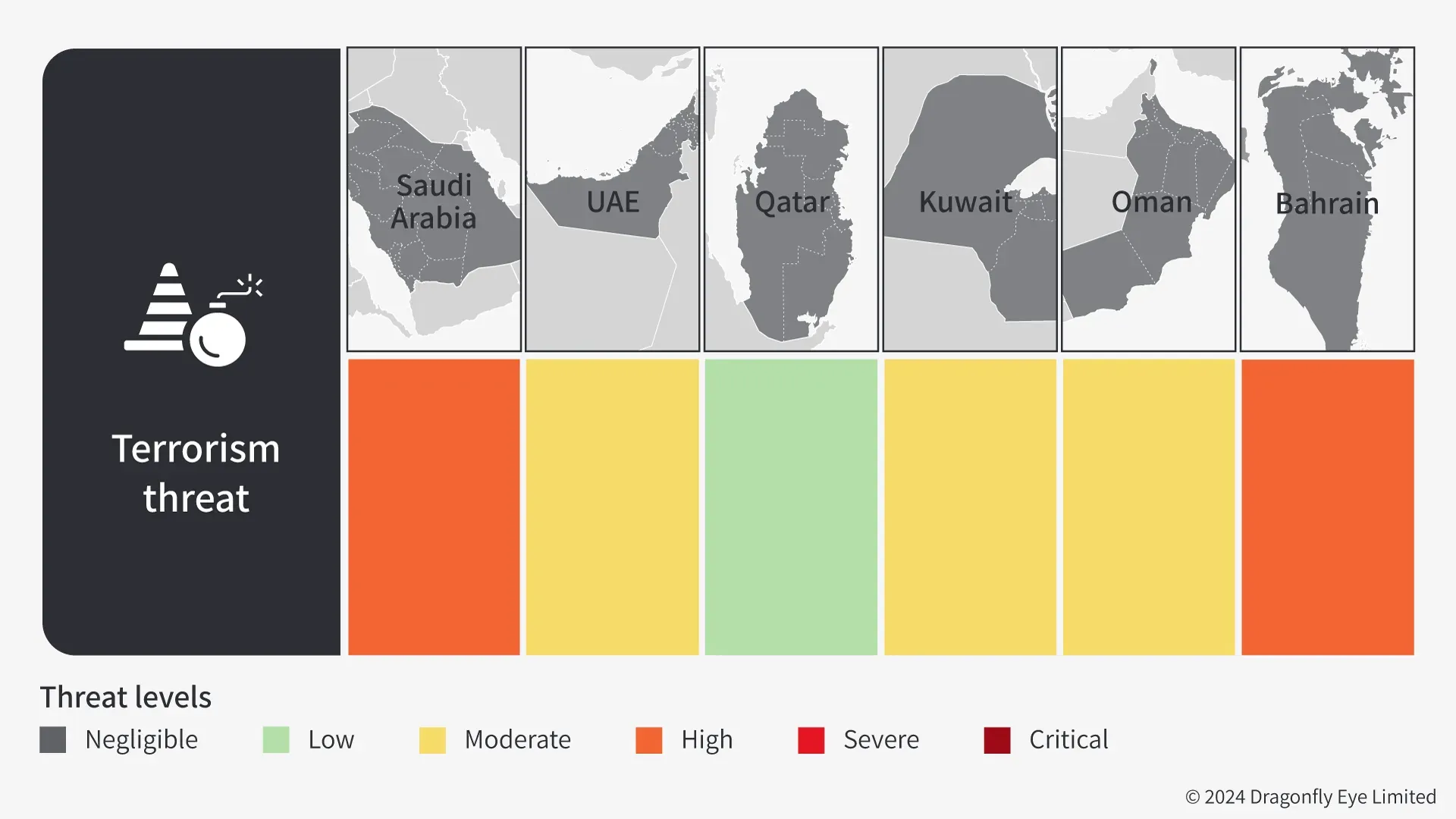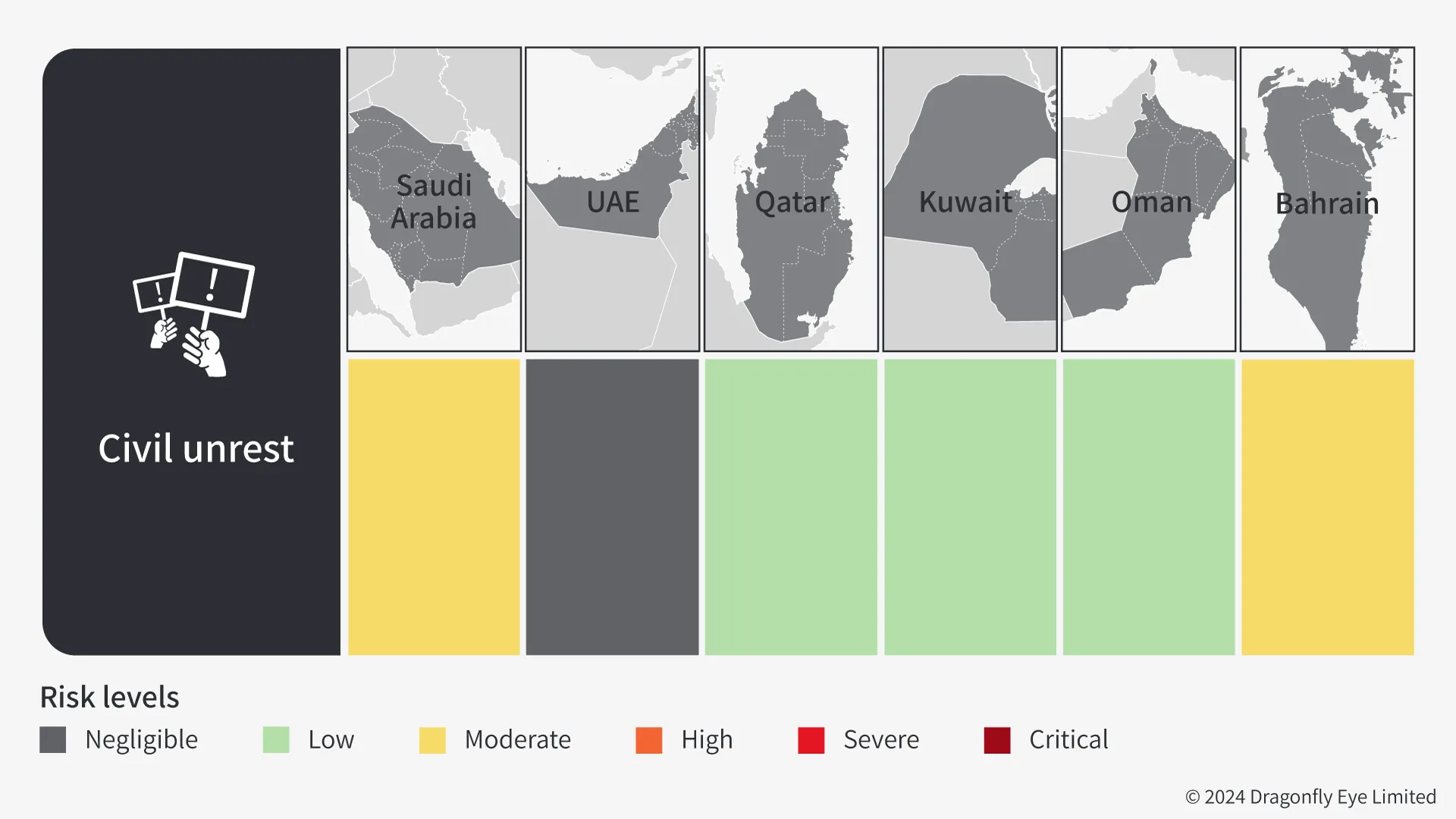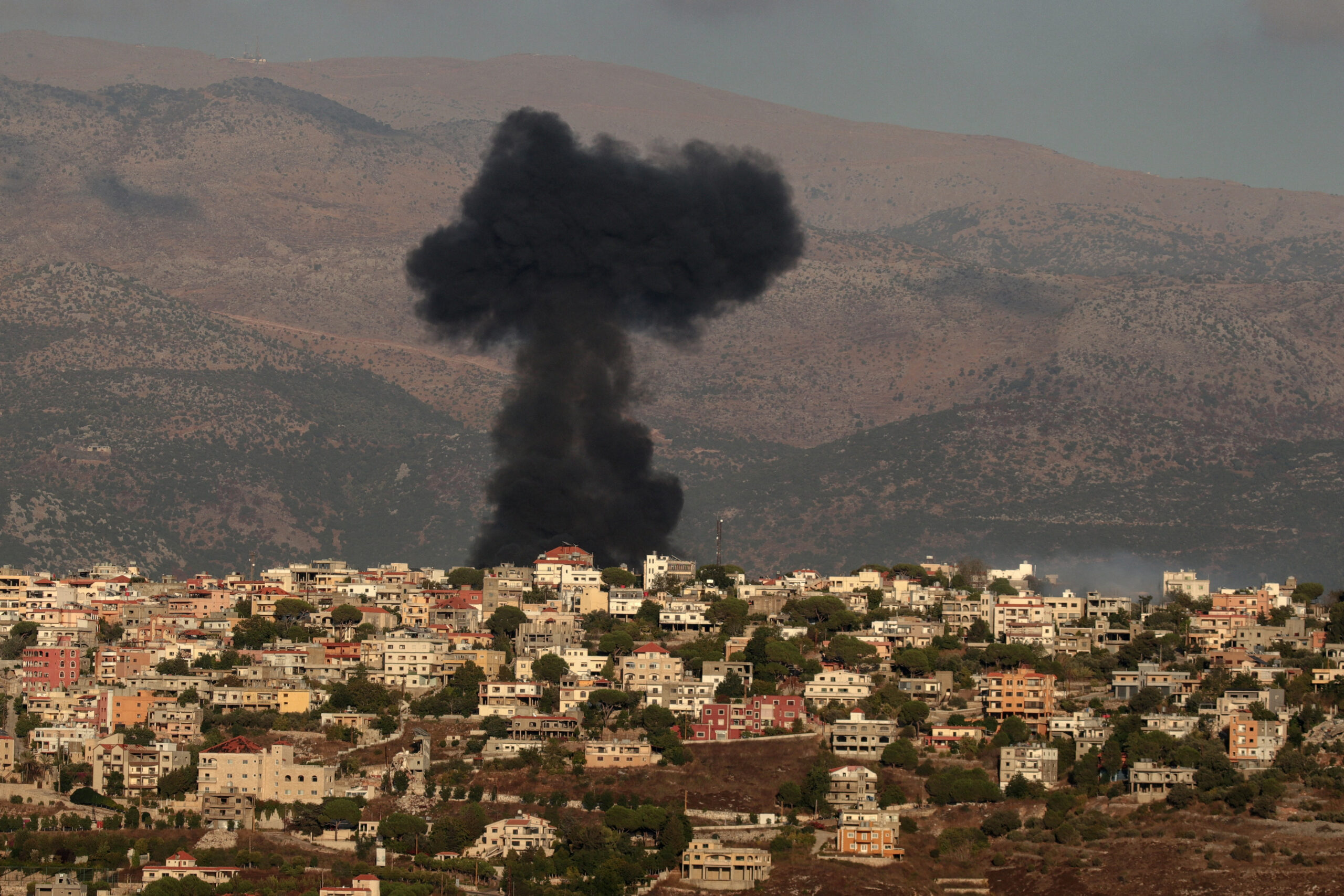Gulf states are likely to remain broadly safe for business operations over the coming year.
This assessment was issued to clients of Dragonfly’s Security Intelligence & Analysis Service (SIAS) on 22 August 2024.
- Those states have so far remained largely unaffected by shifts in regional dynamics and military tensions amid the war in Gaza
- Over the next five years any major region-wide military conflict would however plausibly involve Iran-backed groups targeting US bases in Gulf states; in Saudi Arabia, ports, airports and oil infrastructure would also very probably be targets
The safety and security situation in Gulf states is likely to remain broadly stable over the coming year. The main day-to-day security risks in these countries tend to stem from reckless driving and, to a much lesser extent, petty crime. Those states remain mostly sheltered from the Gaza war. For example, tens of thousands of people across the rest of the Middle East have protested against Israel and in support of Palestinians, but there has barely been any activism in the Gulf. That reflects the authorities’ persistent repression of dissent.
The war in Gaza has led to a heightened terrorism threat globally, including in Gulf states. But jihadists do not seem able to carry out more than a small-scale shooting or stabbing there. Similarly, Iran-backed groups in the region have implied they would target US military interests in the Gulf, but we are doubtful that – short of a major regional war – they would do so at scale. The Houthis are the only group that is able to mount sustained drone or missile attacks on Saudi Arabia (or other Gulf states), but they do not seem prepared to risk peace negotiations by doing so at this time.
Regional military escalation unlikely to significantly worsen Gulf security
Regional tensions continue to loom large. Iran has said it will retaliate against Israel for its targeted assassination of Hamas leader, Ismail Haniyeh, in Tehran at the end of July. We assess that it will probably try to do so in the coming weeks – but that this would not make the Gulf significantly less safe. Should Iran and its allies launch drones and missiles towards Israel these would probably not overfly nor target Gulf countries. At most, Saudi Arabia could conceivably close its northern airspace.

We assess that there is a high risk of a wider regional war between Iran and Israel over the coming five years. That would have a more pronounced impact on the Gulf, particularly should the US be involved. Iran-backed armed groups would seek to target the US military bases in those states. But those tend to be outside of major cities. The exception would be Saudi Arabia, where the Houthis would, in our assessment, mount drone and missile attacks against critical infrastructure, such as airports, ports and oil fields.
Dangerous and reckless driving
Day to day, reckless driving is likely to remain the greatest source of security risk in Gulf countries. The authorities in many of those countries have implemented policies in recent years to improve this, but drivers often tailgate at high speeds and fail to signal. In Dubai, reckless driving is most prevalent on Sheikh Zayed, Khail, Jumeirah Beach, and Al-Wasl roads – the city’s most frequently used routes. In Riyadh, this is prevalent on the King Fahd and King Abdullah roads.
Petty crime risks will probably remain low in Gulf countries. Crime rates are generally low in these countries. This reflects overall social prosperity and strong socio-legal deterrents. And a large portion of the population are expats, whose work permits depend on having a clean police record. Based on our monitoring of local media and conversations with contacts who live or travel there, opportunistic pickpocketing and bag snatching happen occasionally in crowded areas in Kuwait, Saudi Arabia, Oman and Bahrain.
Heightened terrorism threat likely to remain
The terrorism threat in the Gulf is heightened, in our assessment. That will probably remain the case at least throughout the Gaza war – and any eventual conflict in Lebanon or Iran. Since October 2023, jihadists have used the conflict to incite attacks globally. In doing so they have made a few mentions of Gulf countries. For example, in October 2023 Al-Qaeda in the Arabian Peninsula (AQAP) criticised the UAE, which it viewed as backing Israel, and stated that ‘after Israel falls, the UAE will follow’.

Jihadists do not appear able to mount large-scale attacks in Gulf states, however. Any attack would probably be a shooting or stabbing in a crowded area or against a Shia religious site. Last month three gunmen killed six people at a Shia mosque in Muscat, Oman. Islamic State (IS) claimed responsibility. The authorities in the region overall seem prepared to thwart bomb plots. In January, the Kuwait security forces arrested five individuals over an IS-linked plan to bomb Shia places of worship. They arrested an individual they accused of planning a similar attack on US forces in May.
Iran-backed armed groups pose a low threat
Iran-backed militant groups also pose a threat to Gulf countries. That is mainly due to the large number of US military bases in those countries. In October 2023, Iraq-based groups stated that they considered US bases in the UAE and Kuwait as ‘legitimate targets’. The Houthis in Yemen last month also threatened to target critical infrastructure in Saudi Arabia again. And Bahrain-based militant groups have also in the past threatened Israeli interests there.
But those groups’ abilities to successfully attack Gulf countries seem limited. They have struggled to do so in recent years. Armed groups in Iraq have failed to do so multiple times despite their proximity to Gulf states. The Houthis in Yemen have been the only group to successfully attack Gulf states, namely Saudi Arabia and the UAE. But since last year, a rapprochement between Saudi Arabia and Iran and ongoing Saudi-Houthi peace talks seem to have dissuaded the group from launching such attacks. It seems to prefer targeting Israel and naval and commercial vessels in the Red Sea and Gulf of Aden.
Limited protests
Mass protests are highly unlikely in Gulf countries. Local governments usually quickly repress any form of public criticism, including on sensitive issues, such as Israel-Palestine. The UAE authorities in July deported a foreign student who shouted ‘Free Palestine’ on stage at his graduation in Abu Dhabi. And Saudi Arabia in recent months has reportedly been detaining an undisclosed number of citizens even for posting pro-Palestine and anti-Israel comments online.

However, small and peaceful pro-Palestine protests of up to a few hundred people are likely in other Gulf states, mainly after Friday prayers. Demonstrations over this and (in some instances) other issues such as labour disputes, have occurred in:
- Qatar: Imam Abdul Wahhab Mosque, Doha
- Bahrain: Shi’ite towns and villages outside of Manama
- Kuwait: Irada Square, Kuwait City
- Oman: Waterfront, Muscat, or in front of government buildings
The authorities would almost certainly move quickly to quell in the event of any early signs that such protests are escalating into rioting or, for example, violence towards foreigners or foreign interests. It is not unusual for protests to be accompanied by a large number of security force personnel who would use tear gas against demonstrators and arrest participants should those get out of hand. Such instances have been rare in Gulf states in recent years.
Less than an even chance of targeted assassinations by Israel
An Israeli-targeted assassination is a plausible – and potentially high-profile scenario – in a Gulf country. Israel has used this tactic there before, namely in the UAE to assassinate a Hamas leader in 2010. But it seems to hope to maintain stable relations with the UAE and Bahrain while normalising diplomatic ties with Saudi Arabia. It would be reluctant to jeopardise this. Many Hamas leaders are based in Qatar. But in a sign of Israel preferring (or being better able) to carry out such operations elsewhere, it killed Doha-based Hamas leader Ismail Haniyeh in Tehran on 31 July.
Image: Smoke billows during Israeli bombing on the souther Lebanese village of Khiam on, amid ongoing cross-border clashes between Israeli troops and Hezbollah fighters. Lebanon’s health ministry said on August 24 that Israeli strikes killed eight people including a child in different parts of the south, with Hezbollah saying five of its fighters were among the dead, on 23vAugust 2024. Photo by Rabih Daher/AFP via Getty Images.




